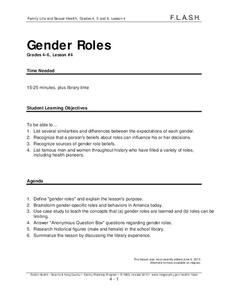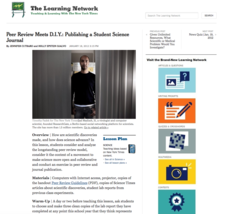Creative Learning Exchange
The Infection Game: The Shape of Change
Encourage the spread of knowledge in your class with this cross-curricular epidemic simulation. Pulling together science, social studies, and math, this lesson engages students in modeling the spread of infectious diseases, collecting...
Nemours KidsHealth
Germs: Grades 6-8
As part of their study of bacteria, viruses, fungi, and protozoa, middle schoolers create engaging public service announcements for preschool and kindergarten classes, teaching them how and when to wash their hands. To begin, class...
Curated OER
When Something's Missing: Diagnosing Vitamin Deficiencies
The New York Times "Education" section posts an extensive lesson on vitamin and mineral deficiencies. It involves class discussion, examination of food packaging labels, and the reading of a blog post about Vitamin D. The highlight of...
Media Smarts
Thinking like a Citizen
Explore the influence social activism can have on important issues, and create a class full of young citizen activists. This plan calls for learners to participate in a whole class discussion and brainstorm about ways to effectively...
California Academy of Science
Rapid Brainstorming: How Can We Improve Our Global Food System?
In 2018, the average fast food burger cost $2.64 while a salad averaged $4.14. Does the price difference matter to public health? Scholars consider that question and others in a brainstorming session about improving our global food...
NOAA
Stressed Out!
Are our oceans really suffering due to the choices humans make? The sixth and final installment in the volume of activities challenges research groups to tackle one of six major topics that impact ocean health. After getting to the...
Discovery Education
Our Brain and Body on Opioids
Use a presentation that explores the world of prescription opioids. Learners look at the way the brain responds to the drugs and the long terms effects opioids have on the brain and body. At the end of the lesson plan, groups create a...
Discovery Education
Is Our Community Influenced by the Opioid Epidemic?
Opioid abuse is becoming a national crisis, but combating the influence of opioids requires examining the ways it affects individual communities. A thorough teacher guide provides step-by-step instructions about implementing an...
Curated OER
Puberty/Adolescence, Day 2: "Who AM I? Where Am I Going?"
A great unit! There is a lot of content that is personal so make sure you have created a safe zone in your classroom before doing this lesson. It will have much more meaning if your learners share their life with others in the class....
PBS
Stories of Painkiller Addiction: Contemplating Nature vs. Nurture
Does having an addict in your family make it more likely to become one yourself? Explore the genetic risk factors, as well as the prominent environmental influences, for substance addiction in a lesson that encourages awareness and open...
Peel-Public Health
What Is Respiratory Infection?
Empower your pupils to be germ stoppers! The heart of these lessons lies in stopping the spread of germs and keeping clean hands in order to prevent cases like a respiratory infection. It includes a game to simulate how germs can spread...
US Department of Health and Human Services
Alcohol: Why Drink When You Can…
Prepare your learners to make good decisions about drinking by providing them with the real facts about alcohol and substance abuse. This resource includes several worksheets explaining how alcohol affects the brain, as well as a general...
Seattle & King County Family-Planning Program
Gender Roles
Class members identify gender-specific roles and expectations in American society today by surveying adults, examining modern entertainment, and researching historical figures.
Curated OER
Peer Review Meets D.I.Y.: Publishing a Student Science Journal
Peer review of science laboratory reports? You bet! First, learners work in pairs to review a scientific article. Then they trade lab reports for peer review. The end result is the publication of a classroom scientific journal!
Baylor College
Measuring and Protecting Skin
Several subjects are addressed within the context of a science lesson about the sun's ultraviolet rays. Elementary earth scientists consider protection of the skin with sunscreens (health), estimating and measuring surface area or an...
American Heart Association
Meet the Calorie
What is a calorie and how does it work? How many calories do we consume in a typical day, and how many do our cells need to function well? Your learners will answer these questions and more using a worksheet, which includes informational...
Purdue University
Healthy Body Image: A Lesson Plan for Middle School Students
This is a very valuable lesson for middle schoolers on the importance of maintaining a healthy body image through diet, exercise, and positive mentality. The resource includes four lesson plans. The first two plans outline the physical...
Common Sense Media
Cyberbullying: Crossing the Line
Teach pupils to identify different forms of cyberbullying, including harassment, deception, “flaming,” and threats to safety, as well as how to handle a situation in which cyberbullying might be involved.
Idaho Coalition
Teen Relationships
Collaborative activities teach adolescents to talk comfortably about teen issues. Class members identify eight factors of healthy relationships among friends, family, and boyfriends/girlfriends. These factors are then used to help...
Baylor College
How Do We Use Water?
Send youngsters home to survey how they use water in their homes. Then bring them together to discuss which uses are essential for our health and which are not. A helpful video offers teaching tips for this lesson, and a presentation...
Baylor College
Defending Against Microbes
In the preceding lesson from the unit, beginning biologists discovered that microorganisms are everywhere, so the question follows, why are we not sick all of the time? Class members read and discuss an article in small groups about...
Baylor College
Mapping the Spread of HIV/AIDS
Where is HIV/AIDS most prevalent and what are the current trends regarding HIV? Have groups work together to map the world's HIV/AIDS rates, then create a class map with all the data. Lesson includes cross-disciplinary concepts including...
Baylor College
Heart and Lungs
With a partner, youngsters measure their pulse and breathing rates, both at rest and after running in place for a minute. While this activity is not novel, the lesson plan includes a large-scale classroom graphing activity and other...
EngageNY
Interpreting, Integrating, and Sharing Information: Using Charts and Graphs about DDT
Is American growing fatter? Scholars begin with a mini lesson plan on reading charts and graphs using information about Human Body Fat in United States. They then transfer what they learned to charts and graphs using harmful and...
Other popular searches
- Public Health Issue
- Aids Public Health
- Public Health Care
- Black Death Public Health
- Public Health Week
- Epidemic Public Health
- Public Health Resources
- Public Health Needs
- Microbes and Public Health
- Public Health Lessons
- Public Health Pollution
- Public Health Service Message

























